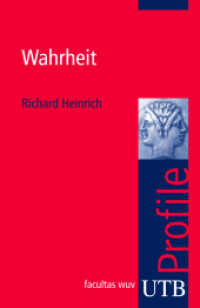- ホーム
- > 洋書
- > 英文書
- > History / World
Full Description
This book presents pieces of evidence, which - taken together - lead to an argument that goes against the grain of the established Cold War narrative. The argument is that a "long détente" existed between East and West from the 1950s to the 1980s, that it existed and lasted for good (economic, national security, societal) reasons, and that it had a profound impact on the outcome of the conflict between East and West and the quintessentially peaceful framework in which this "endgame" was played. New, Euro-centered narratives are offered, including both West and East European perspectives. These contributions point to critical inconsistencies and inherent problems in the traditional U.S. dominated narrative of the "Victory in the Cold War." The argument of a "long détente" does not need to replace the ruling American narrative. Rather, it can and needs to be augmented with European experiences and perceptions. After all, it was Europe - its peoples, societies, and states - that stood both at the ideological and military frontline of the conflict between East and West, and it was here that the struggle between liberalism and communism was eventually decided.
Contents
Acronyms and Abbreviations
Introduction
Oliver Bange and Poul Villaume
PART I: Long Perspectives On Détente
1 East-West Conflict: Short Cold War and Long Détente
An Essay on Terminology and Periodization
Gottfried Niedhart
2 The Long Détente and the Soviet Bloc, 1953-1983
Csaba Békés
PART II: East-West Trade
1 Soviet Snowdrops in the Ice Age?
The Surprising Attempt of an Early Economic Détente in 1952
Mikhail Lipkin
2 European Long-Term Investments in Détente
The Implications of East-West Economic Cooperation
Werner Lippert
PART III: The Inextractability of External and Domestic Security
1 No End to "Political Ideological Diversion"
The Stasi Perspective as Circumstantial Evidence for a Long Détente
Oliver Bange
2 New Security Concepts and Transnational Party Networks, 1976-1983.
The Socialist International, Scandilux, and the Overcoming of the Crisis of Détente
Rasmus Mariager
PART IV: Détente in Europe: Change in Perceptions
1 Continuity and Transformation
Alternate Visions of Italy's Three Decades of Détente
Laura Fasanaro
2 Perception of the Other: "Kremlinologists" and "Westerners"
East and West German Analysts and Their Mutual Perceptions, 1977-1985
Sabine Loewe-Hannatzsch
PART V: Détente in Europe: Change in Diplomatic Framings
1 Pathfinders and Perpetuators of Détente
Small States of NATO and the Long Détente: The Case of Denmark, 1969-1989
Poul Villaume
2 Overcoming the Crisis of Détente, 1979-1983
Coordinating Eastern Policies between Paris, Bonn, and London
Christian Wenkel
PART VI: The U.S. Story: from Cooperation to Confrontation and Back
1 Lyndon B. Johnson and the Building of East-West Bridges
Catching Up with Détente in Europe, 1963-1966
Gry Thomasen
2 Between Power Politics and Morality
The United States, the Long Détente, and the Transformation of Europe, 1969-1985
Stephan Kieninger
Select Bibliography
Index
About the Editors and Contributors





